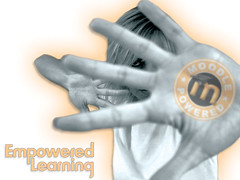Topic outline
General
First things first...
Topic 1
Session 1: Introduction and Basics of an Online Course
- Welcome on board of this three session Moodle journey!
What is Moodle?
Moodle stands for Modular Object Oriented Dynamic Learning Environment. What does this actually mean?
What can Moodle do for me?
Moodle is more than just a repository for Word documents and Powerpoints. Moodle should be your online communication channel with your class: it is your chance to build your own online community! The challenge is to make it fun and engaging - a place where your students want to be.
The system's flexible nature allows you to create learning journeys that encourage active engagement with the subject of study: get students involved in shaping the content on the page and start fostering a sense of ownership, peer learning and collaboration through activities, such as Glossaries, Forums and Quizzes.
Course Layout Options and Settings
There are three standard course layouts to choose from. Take the quick tour to see screenshots of the options and help you decide which layout would best suit your course:
User Management
Any user with the appropriate access rights can assign other users to courses through the "Assign Roles" option in the Admin Menu.
All editing Teachers can add/remove students; Teachers can also add or remove other Teachers as and when required. Only the main site Administrator can add other Administrators.
Check Your Knowledge:
Further Resources
Topic 2
Session 2: Managing an Online Course
The story so far...
You now have a good idea what Moodle is and how it can be used to extend and support your classroom teaching. You have decided on a course layout and are comfortable with the basics of user management. Try the recap quiz to refresh your memory.
In this session you will find out more about some important background work, the versatility of web pages and you will get an overview of how to grade activities on your course.
Getting started
You have an empty course page and some word documents. Now what? Let's look first at some of the fundamentals when working with files on Moodle.
More than Word(s)
Being an online environment, Moodle is so much more than an 'online filing cabinet' of MS Office documents. Here are a few suggestions:
Assignments can be used for more than just assessment. It can be used for any kind of file submission. Find out more about assignments here
On Your Marks: the Gradebook
The Moodle Gradebook is a powerful tool to help you monitor and chart your students' progress throughout the course. All activities that you apply grades to automatically appear here.
Further Resources
Topic 3
Session 3: Making Effective Use of Online Learning
- Recap: The Story So Far
You've got your course layout sorted and your files arranged neatly. You should also be well conversant with uploading and linking to your own content by now. But what about other content? How can you use Moodle even more effectively? What else could you add to further engage learners?
The internet is full of material and provides fabulous opportunities to personalise learning. How do you find and use internet content creatively, sensibly and without infringing copyright?
Quizzes
Quizzes are the ultimate long-term time saver in any course. Why spend your time marking when Moodle can do a lot of it for you? Find out how in the module below.
Glossaries
The Glossary is a great tool to encourage students to work collaboratively and encourage peer review. Find out all you need to know from the Glossary unit below:
Course Content
If your courses are full of MS Word and MS PowerPoint files, you are not making the most of what the Internet can offer you and your students!
Take the Course Content module to give you some idea on how you could incorporate web content right here in your course rather than have your students wander aimlessly around on Google:
Copyright
Copyright is often not very clear, and the process of getting clearance to use "All Rights Reserved" materials can be long winded and frustrating. However, there is another way: Creative Commons and Open Course Ware. Find out more about the legal side of using and adapting content in the following learning module:
Personalised Learning
Personalised Learning - what does that actually mean? How do you define what personalisation is? Is it just an eILP or does it go further?
Further Resources
The following links and resources will provide more background, tips and tricks to using Moodle and eLearning in general. Please take a look at them and provide your feedback in the Course Discussions Forum.
Topic 4
Following on from here...- You have come this far and got the bigger picture. Now it's time to pick your specialism!
Please pick your follow-on training session from the Choice below:
